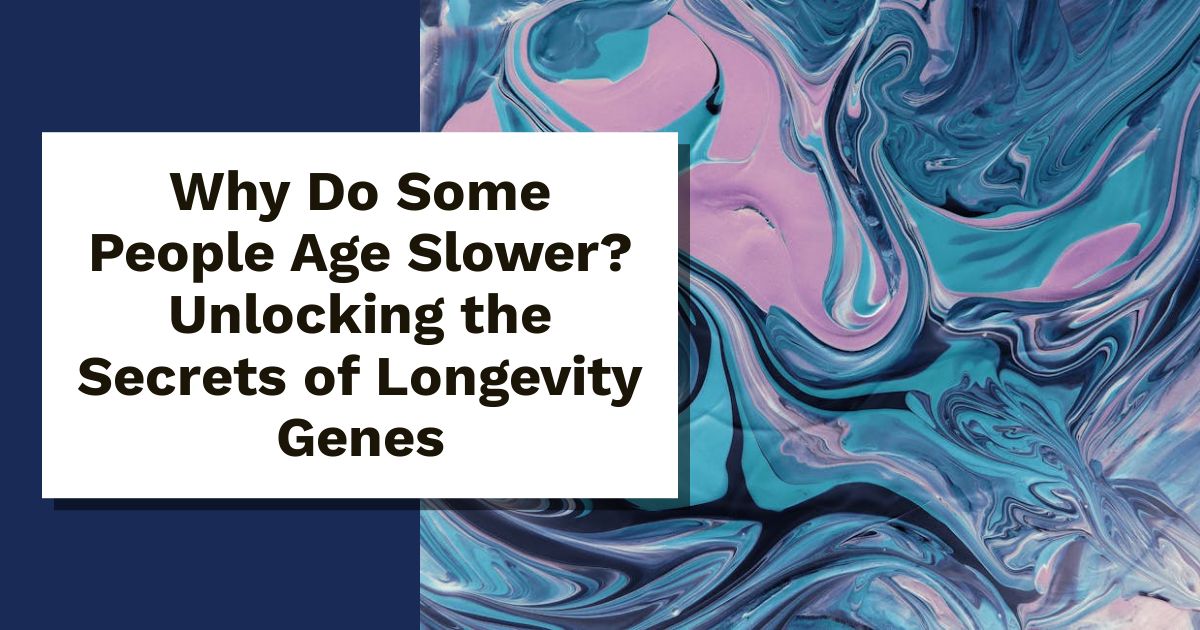Ever wondered why some people seem to defy age? The secret might lie in their genes. Longevity genes play a big role in how we age, influencing everything from cell repair to metabolism.
In this post, we’ll dive into what these genes are and why they matter. You’ll discover how they contribute to a longer, healthier life. Plus, we’ll explore ways to optimize your own genetic potential for aging gracefully.
Get ready to unlock the science of aging and find out what you can do to join the ranks of the ageless!
What are Longevity Genes?
Longevity genes are like your biological allies in the fight against aging. These genes influence how well your body maintains itself over the years. You may have heard of the “longevity gene” buzz, but what are the specifics?
Genetic Factors
Certain genes have been linked to longer life spans, and those genes pack a punch when it comes to how we age. For instance, the FOXO3 gene is often cited as a superstar among longevity genes. This gene is associated with stress resistance and improved metabolic health, which can help you live longer. Other key players include the SIRT1 and CETP genes, both linked to the body’s ability to manage energy and inflammatory processes.
Research suggests that about 20% to 25% of the variation in human longevity can be attributed to genetics, not just lifestyle choices. This study shows how family studies demonstrate the genetic component of longevity. It becomes clear that genetics could be a foundational aspect of aging well.
Influence on Aging Process
So, how do these longevity genes actually influence aging? Think of them as the body’s maintenance crew. They play crucial roles in processes like DNA repair, cell regeneration, and the ability to combat oxidative stress. For example, the SIRT1 gene helps regulate the body’s response to stress and age-related diseases. Meanwhile, FOXO3 is tied to improved cardiovascular health, meaning it helps keep your heart ticking longer.
Moreover, these genes interact with one another, creating a symphony of biological functions that can slow down the aging process. This article explains how these genetic interactions can promote longevity.
With the right genetic lineup, your body can effectively manage wear and tear, keeping the signs of aging at bay. Imagine having an internal clock that operates smoothly, allowing you to feel youthful even as the calendar pages turn.
Understanding these genetic factors opens the door to biohacking your own aging process, paving the way for a longer, healthier life.
How Longevity Genes Work
Longevity genes play a fascinating role in how we age. They’re not just abstract notions but have real, tangible effects on our bodies. By aiding cell repair and reducing inflammation, these genes can make a significant difference in our overall health and longevity. Let’s explore how these genes function in these two crucial areas.
Cell Repair and Maintenance
Longevity genes are like your body’s personal repair team. They help fix damage at the cellular level, ensuring everything runs smoothly. Take the SIRT6 gene, for instance. This gene is often hailed as a “longevity gene” due to its vital role in DNA repair. With SIRT6 in action, your cells can efficiently mend broken DNA – a process that’s essential for healthy aging. Research shows that effective DNA repair can lead to increased lifespan and cellular health. For more on this, check out this study on SIRT6.
But it doesn’t stop there. Other longevity genes are equally crucial. They promote the body’s ability to handle oxidative stress, which can cause cellular damage. Think of it this way: if your cells are like a car, longevity genes are the mechanics that keep everything in tip-top shape. Without them, you’d be facing major wear and tear!
Studies have shown that the decline in DNA repair capacity is linked to aging. Losing this ability doesn’t just hinder longevity; it also affects cellular function. For more details about the role of DNA damage repair in aging, explore this article.
Inflammation Reduction
Inflammation is a natural response to injury or illness, but chronic inflammation can speed up aging. Fortunately, longevity genes are there to help combat this issue. These genes play a significant role in reducing inflammation, making them vital allies in the quest for a longer life.
For example, the BPIFB4 gene has been found to correlate with reduced inflammation. This longevity-associated gene helps lower the risk of cardiovascular complications, which are often exacerbated by chronic inflammation. To see how this works, check out this relevant study.
Another player worth mentioning is the S6K1 gene. Research indicates that blocking S6K1 in aged mice reduced inflammation by suppressing the production of harmful proteins. This discovery provides a glimpse into how targeting these genes can help maintain a healthier lifespan. Interested? Learn more in this study on S6K1.
With longevity genes working hard to repair damage and keep inflammation at bay, your body stands a better chance of aging gracefully. These genes are like a safety net, catching potential problems early on to ensure you can continue to thrive as the years go by.
Lifestyle Factors That Interact with Longevity Genes
Exploring how our lifestyle choices affect the expression of longevity genes can be eye-opening. From the food we eat to how we manage stress, these factors can either support or hinder our genetic potential. Let’s look at three key areas where lifestyle has a significant impact.
Diet and Nutrition
Healthy eating isn’t just a trend; it’s a fundamental pillar of longevity. What you consume can drastically influence how your longevity genes function. Diets rich in fruits, vegetables, whole grains, and healthy fats can keep these genes activated. It’s like giving your body premium fuel that helps maintain its machinery.
- Mediterranean Diet: This diet is known for its heart-healthy properties. Foods rich in omega-3 fatty acids and antioxidants play a role in reducing inflammation and oxidative stress, keeping your genes in tip-top shape. Healthy Longevity – The Nutrition Source explains how specific eating patterns reduce the risk of chronic diseases.
- Caloric Restriction: Studies show that eating fewer calories without malnutrition can have life-extending effects. It encourages cells to repair and regenerate, enhancing gene expression linked to longevity. A recent study highlights that adherence to healthy dietary patterns can prevent disease and affect life expectancy.
Nutrition is a powerful tool. Choosing the right foods can actively support your body’s health, promoting a longer, active life.
Exercise and Physical Activity
Staying active is like turning on the activation switch for your longevity genes. Regular physical activity boosts gene expression involved in longevity. Exercise releases endorphins, improves mood, and helps manage weight, but it does even more.
- Gene Activation: Research suggests physical activity can have a stronger role than genetics in determining how long you live. Engaging in regular exercise activates genes that support muscle and heart health. This article details how physical activity can enhance longevity.
- Reduced Mortality Risk: Studies show a strong connection between leisure-time physical activity and lower all-cause mortality rates. So, choosing to move more helps keep your longevity genes firing on all cylinders. Check out more findings on the physical activity and mortality connection in this study.
By integrating movement into your daily routine, you can encourage your body to express those longevity genes, leading to a healthier, longer life.
Stress Management
Chronic stress can be a silent assassin, affecting how our genes express themselves. Managing stress isn’t just good for your mind; it’s crucial for your genetic health.
- Epigenetic Changes: Research has shown that chronic exposure to stress hormones can lead to modifications in DNA. This means stress can alter the way our longevity genes work. Discover how stress hormones lead to epigenetic changes.
- Mindfulness and Relaxation: Techniques like meditation, yoga, and deep-breathing exercises can help lower stress levels. These practices not only enhance mental health but can also reverse some of the negativity that stress causes on a cellular level. Explore more about managing stress and its impact on gene expression in this study.
Taking time to manage stress can be a game-changer for your longevity. When stress is under control, it allows your body to focus on maintaining health and wellness, enabling your longevity genes to shine.
Real-Life Examples of Longevity
Understanding why some people seem to age slower becomes easier when we look at real-life examples of longevity. These stories and places offer insights into the secrets of a longer life.
Blue Zones
Blue Zones are fascinating regions where people live significantly longer than the average. They boast high concentrations of centenarians, often living healthy and active lives well into their 100s.
What makes these areas special? A mix of lifestyle, diet, and community plays a crucial role. Here are some notable Blue Zones:
- Okinawa, Japan: Known for a diet rich in vegetables and low in calories. The locals cultivate strong relationships, leading to lower stress levels.
- Sardinia, Italy: Residents have a diet mainly consisting of whole grains, cheeses, and red wine. The rugged terrain keeps them physically active well into old age.
- Nicoya Peninsula, Costa Rica: Here, people prioritize family and maintain a purpose in life. A diet high in beans and corn helps too.
- Ikaria, Greece: This island’s population enjoys a Mediterranean diet full of fruits, vegetables, and herbs. They also have low rates of dementia!
These unique lifestyles promote health and well-being. For deeper insights, visit Blue Zones or check out this Healthline article.
Famous Centenarians
Famous centenarians shine a spotlight on what it means to live a long life. Their stories inspire us to consider our paths toward longevity. Here are a few renowned individuals who reached the remarkable milestone of 100 years:
- Jimmy Carter: The former U.S. President embodies resilience and commitment to community service. His dedication to humanitarian efforts has made a lasting impact.
- Olivia de Havilland: This iconic actress enjoyed a vibrant life of acting and advocacy. She lived with grace until her passing at the age of 104.
- Supercentenarians like Jeanne Calment, who lived to be 122, show how extraordinary life can be with the right genes and lifestyle choices.
A wealth of resources detail these incredible lives. For a complete list, visit Wikipedia’s list of centenarians, which showcases many individuals who exemplify long-lasting vitality.
These real-life examples and remarkable stories help us understand the potential for healthy aging. As we think about our longevity genes, they remind us that lifestyle choices play a significant role in the years we have ahead.
The Future of Longevity Research
As we explore the enchanting world of longevity genes, we can’t overlook the exciting advancements on the horizon for longevity research. Two key areas are making waves: gene therapy and personalized medicine. These innovations might just hold the key to unlocking our genetic potential for a longer, healthier life.
Gene Therapy
Gene therapy is positioned at the forefront of aging research. Imagine a world where our genes can be tweaked to optimize how our bodies age. This prospect is inching closer to reality. Researchers are developing innovative gene therapy techniques that target aging-related diseases.
One promising area focuses on partial reprogramming. Studies, like this one on Gene Therapy-Mediated Partial Reprogramming, show that it can extend the lifespan and reverse age-related changes in mice. This could mean a future where your body can effectively reset its age, giving newer cells the chance to flourish.
Another angle examines specific genes linked to aging. For instance, new therapies are being explored to help combat age-related decline by enhancing the performance of longevity genes. Check out this piece on 6 Gene Therapies That Could Slow Aging. It dives into the technologies in play and how they aim to keep our biological clocks ticking healthily.
The possibilities are vast. As our understanding of gene therapy sharpens, researchers are aggressively hunting for ways to repair and rejuvenate our cells. This could reshape the way we think about aging.
Personalized Medicine
Personalized medicine takes this concept even further. Imagine healthcare tailored just for you, based on your unique genetic makeup. It’s becoming the norm, and it’s got significant implications for longevity.
With advances in technology, doctors can analyze your DNA and make specific recommendations. This can lead to personalized treatments that cater to your individual health needs. A recent article explores how personalized medicine has the power and potential to extend your life. The goal is not just to treat illnesses but to enhance overall well-being and lifespan.
Integrative approaches in personalized medicine blend lifestyle choices with genetic insights. This means your diet, exercise routine, and stress management tactics could all be optimized based on your genetic profile. Learn more about this exciting trend by checking this article on why personalized medicine is a potential game changer.
As we customize our health strategies, we may not only live longer but live better. Personalized medicine represents an evolution in how we think about our health, making longevity something we can actively pursue.
These advancements in gene therapy and personalized medicine are reshaping our understanding of aging, creating opportunities for people to take charge of their longevity journey. Imagine the possibilities that await as these fields continue to evolve!
Conclusion
Longevity genes are remarkable players in the aging game. They affect how well we age by promoting cell repair and reducing inflammation. These genes help some people stay youthful while others show signs of aging more quickly.
Understanding these genes offers an exciting glimpse into the future of health and longevity. As research advances, we might unlock even more secrets to aging gracefully.
What choices will you make today to support your longevity genes? Your future self might just thank you!
Brooke is a rock-climbing 🧗♀️, tennis-playing 🎾, biohacking 🧬 bookworm 📚 on a mission to unlock the secrets of health, longevity, and living life to the fullest 🌟. When she’s not scaling cliffs, hitting the courts, or testing out the latest hacks, you’ll find her nose in a book or adventuring with her four-legged best friend 🐕 by her side. With a knack for turning science into simple, actionable tips, Brooke’s writing is your guide to hacking your biology and living your best, most vibrant life!


